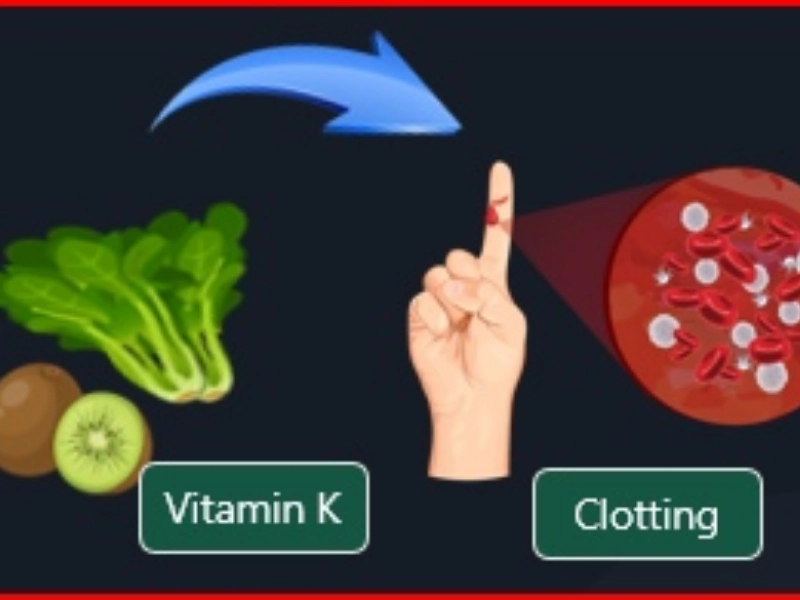The Role Of Vitamin K In Promoting Dental Health
Menaquinone, or vitamin K2, stimulates the proteins that supply calcium to the teeth and bones. This is significant because, in the absence of vitamin K2, calcium is directed toward the arteries rather than the proper place. Vitamin K2 was abundant in the prehistoric diet that Weston Price examined. Vitamin K2 can be found in vegetables, dark greens, animal products, and fermented foods like natto and kefir. Another vitamin that is crucial for dental health is potassium, which promotes wound healing and improves blood coagulation.
Vitamin K is necessary for blood coagulation.

Vitamin K is necessary for the metabolism of bones.
 Vitamin K, in spite of its relative obscurity, is vital to the health of teeth and bones. It works in tandem with vitamin D to move calcium from the circulation and soft tissues into the bones and teeth. This process, known as mineralization, is what keeps teeth healthy overall, encourages remineralization, and wards off dental decay.
Vitamin K2 activates the calcium-binding properties of bone proteins, such as matrix GLA protein and osteocalcin. By halting the accumulation of calcium deposits in the arteries, vitamin K2 also helps to prevent heart disease. Additionally, it has been demonstrated to enhance insulin sensitivity and lessen oxidative stress.
Dr. Price observed that early cultures that stuck to their ancestral diets had teeth that were extremely resistant to dental decay, faces with well-formed teeth that weren't crowded or misaligned, and a lower risk of developing chronic illnesses. As a result, he postulated that vitamin K2 was among the components lacking in contemporary diets. A diet rich in K2 has been shown to prevent tooth decay and encourage remineralization.
Vitamin K, in spite of its relative obscurity, is vital to the health of teeth and bones. It works in tandem with vitamin D to move calcium from the circulation and soft tissues into the bones and teeth. This process, known as mineralization, is what keeps teeth healthy overall, encourages remineralization, and wards off dental decay.
Vitamin K2 activates the calcium-binding properties of bone proteins, such as matrix GLA protein and osteocalcin. By halting the accumulation of calcium deposits in the arteries, vitamin K2 also helps to prevent heart disease. Additionally, it has been demonstrated to enhance insulin sensitivity and lessen oxidative stress.
Dr. Price observed that early cultures that stuck to their ancestral diets had teeth that were extremely resistant to dental decay, faces with well-formed teeth that weren't crowded or misaligned, and a lower risk of developing chronic illnesses. As a result, he postulated that vitamin K2 was among the components lacking in contemporary diets. A diet rich in K2 has been shown to prevent tooth decay and encourage remineralization.
Maintaining oral health standards Vitamin K
 Eating all the vitamins and nutrients we need and avoiding unhealthy meals are essential for maintaining the health of our teeth and gums. It has long been understood that maintaining dental health requires both a balanced diet and excellent oral cleanliness, but new research has identified another crucial component that cannot be disregarded: vitamin K2.
In order to transfer minerals from soft tissue and the bloodstream into bones and teeth, vitamin K2 and MK7 work in tandem with calcium and vitamin D. To keep our teeth and bones strong, the protein osteocalcin needs vitamin K2 to activate and guide calcium to the right places.
If your diet isn't providing you with enough Vitamin K2, you can supplement it by eating egg yolks from grass-fed animals, butter, firm and soft cheeses, chicken liver pate, and natto, a Japanese fermented soybean product. It is also available as a supplement.
Eating all the vitamins and nutrients we need and avoiding unhealthy meals are essential for maintaining the health of our teeth and gums. It has long been understood that maintaining dental health requires both a balanced diet and excellent oral cleanliness, but new research has identified another crucial component that cannot be disregarded: vitamin K2.
In order to transfer minerals from soft tissue and the bloodstream into bones and teeth, vitamin K2 and MK7 work in tandem with calcium and vitamin D. To keep our teeth and bones strong, the protein osteocalcin needs vitamin K2 to activate and guide calcium to the right places.
If your diet isn't providing you with enough Vitamin K2, you can supplement it by eating egg yolks from grass-fed animals, butter, firm and soft cheeses, chicken liver pate, and natto, a Japanese fermented soybean product. It is also available as a supplement.
The importance of vitamin K in oral hygiene is crucial.
 Maintaining optimal dental health requires that your body have the appropriate quantity of vitamin K. It promotes healthy blood coagulation to stop bleeding during dental operations and aids wound healing in its early stages.
It has long been understood that maintaining proper dental hygiene requires the optimal mix of nutrients. This entails maintaining proper oral hygiene and consuming adequate amounts of calcium, phosphorus, and vitamin D.
But we have just recently learned about vitamin K2's function in tooth protection. Dr. Weston Price observed in his research on prehistoric cultures that individuals following their ancestral diet had appropriately shaped faces, resistant tooth decay, and a lower risk of developing chronic illnesses. Additionally, he discovered that using butter rich in a natural chemical he called "activator X" allowed their teeth to remineralize. Vitamin K2 was subsequently found to be activator X. To make sure you're getting the recommended levels of this vitamin, you need to incorporate a range of green vegetables and fermented foods into your diet.
Maintaining optimal dental health requires that your body have the appropriate quantity of vitamin K. It promotes healthy blood coagulation to stop bleeding during dental operations and aids wound healing in its early stages.
It has long been understood that maintaining proper dental hygiene requires the optimal mix of nutrients. This entails maintaining proper oral hygiene and consuming adequate amounts of calcium, phosphorus, and vitamin D.
But we have just recently learned about vitamin K2's function in tooth protection. Dr. Weston Price observed in his research on prehistoric cultures that individuals following their ancestral diet had appropriately shaped faces, resistant tooth decay, and a lower risk of developing chronic illnesses. Additionally, he discovered that using butter rich in a natural chemical he called "activator X" allowed their teeth to remineralize. Vitamin K2 was subsequently found to be activator X. To make sure you're getting the recommended levels of this vitamin, you need to incorporate a range of green vegetables and fermented foods into your diet.








